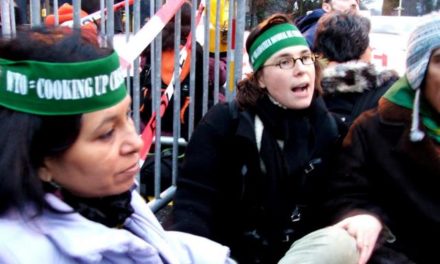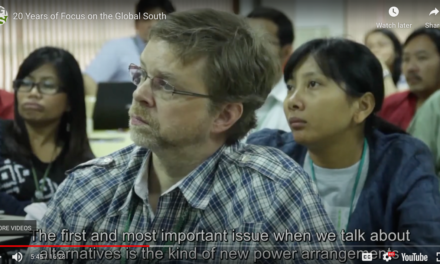Conference on International Finance, Corporate Globalisation and
Alternatives
July
15-17, 2007
Organised by: Bretton
Woods Project, Eurodad, Fifty Years is Enough, Focus on the Global
South, Gender Action, IDEAS, Jubilee South APMDD, Solidarity Africa
CONFERENCE VENUE: Maha
Chulalongkorn Hall, Faculty of Arts Building,
Chulalongkorn
University, Phyathai Rd., Bangkok, Thailand [![]() Map to the Venue]
Map to the Venue]
Introduction
Ten years ago in July, a financial
crisis that erupted in Thailand spread rapidly across the region and
collapsed most of the "miracle economies" of the region.
Practically bankrupting several countries in the short term, the
crisis expanded and deepened poverty in these countries in the long
term. The cause of the crisis was fluid finance which, unfettered by
national regulation, flew in and out of East Asia's economies
rendering them vulnerable to speculative attacks and manipulation.
Ten years later, the scars of the financial crisis are still visible
in Asia in terms of impacts on human/social and economic development,
national policies and financial vulnerability. Following the Asian
experience, similar crises erupted in other countries as well (for
example, Turkey and Argentina), revealing the extreme fragility of
countries exposed to the vagaries of unregulated finance and
subjected to policy regimes that demand indiscriminate financial and
economic liberalisation, financial deregulation and over-dependence
on external markets to meet national development priorities.
Finance is at the heart
of the global capitalist economic system.
The dominant characteristics of the present phase of global capitalism
— corporate globalisation — are the unrestrained power of finance and capital
flows, the expansion and explosion of financial markets, the increasing
sophistication and complexity of financial instruments, and the growing
disconnect between the real economy and financial markets. Financial transactions — especially equity
investment and currency speculation — have direct impacts on national economic
policies and development strategies. Privatisation, trade liberalisation
(especially in services as well as commodities), debt, development financing,
interest rates, corporate take-overs and exchange rates, are all driven by the
interests of financial markets. Financial markets and investors define the
limits of national autonomy in economic policy and a country's economic
"health" is judged by stock market indices, private capital flows and
the extent to which the country is a favoured destination for private
investment.
Understanding how finance works is key to
understanding how corporate globalisation works. It is also key to understanding the changing
nature of development finance, political alignments within international/global
development and financial institutions, and the motivations that shape
bilateral and multilateral economic development approaches and agreements. For activists, civil society organisations
and peoples' movements committed to resisting and halting corporate
globalisation, understanding finance is a crucial precondition to developing
effective campaign strategies that go to the heart of the current system of
global capitalism and to imagining alternatives to corporate globalisation.
This concept paper presents a proposal for
a conference to bring campaigners, activists and policy researchers from
diverse regions and sectors, to build a collective understanding about global
finance, and to share ideas and plans for common campaigns on finance and
financial institutions. The co-organisers of
the conference are members of a broad coalition to dis-empower the IMF, and
view the conference a key step in deepening and expanding campaigns to
dis-empower the Bretton Woods system.
The conference discussed in this paper
follows from an earlier conference titled A
Decade After: Recovery and Adjustment since the East Asian Crisis from
July 12-14, organised by IDEAS, Good
Governance for Social Development and the Environment Institute (GSEI), Action
Aid and Focus. IDEAS is an international network of
heterodox economists committed to grounded policy analysis on global finance
and the economy.
This conference–from July 12-14–will be
organised by IDEAS, GSEI, Action Aid and Focus, and focus on recovery and adjustment since the
Asian Financial Crisis, policy responses to the crisis, impacts of the crisis
and the evolution of the financial markets in the past ten years. In
particular:
(a)
How the
particular choices made after the crisis influenced the differential dependence
on and impact of new forms of finance in different countries and the
transformation of the nature and role of the financial sector;
(b)
How this affected
the development trajectories and outcomes of the countries concerned, with some
attention to the substantial dilution of the developmental role of the State,
the growing presence of foreign firms and the increase in consolidation in the
real sectors, a possible neglect of agriculture, and the impact all this has
had on employment, social indicators and the environment;
It is envisaged that many participants will
attend both conferences-A Decade After… as well as Understanding Global
Finance…. It is also expected
that the first conference will be more theoretical and the second conference
will be more oriented towards advocacy, campaign building and strategising
towards alternatives. Some of the
speakers at the A Decade After… conference will stay on as
resource persons for the Understanding Global Finance… conference.
The last session of this conference will be a crossover or linking session to
the second conference and integrate campaign building, advocacy and analytical
understanding built through the two conferences.
Conference Objectives
The conference Understanding global
finance–Building International Resistance is proposed to better equip
campaigners from peoples' movements and civil society organisations with
analytical tools to tackle the above
issues, and also to bring campaigners and activist-minded academics and
policy analysts to strategise together.
The conference specifically aims to:
- Equip campaigners in key sectors and networks with the
information and analysis on how the global financial system is developing,
the manner in which it shapes development finance, and the role of key
international institutions (especially the International Monetary Fund and
the World Bank) in the current regional and global financial architecture;
2.
Take stock of, deepen understanding about
and build consensus on analysis of the current crises and recent developments
in the IMF and the World Bank (shrinking income and contributions, early pay
backs, reduction of clients, recent challenges to roles and policies, the
Wolfowitz crisis and resignation, etc.);
3.
Draw links between specific campaigns on,
for example, water, gender, corporate power, global warming, trade, labour,
debt and International Financial Institutions (IFIs), and the actions and
interests of financial markets and financial institutions;
- Investigate whether there are common campaign strategies
directed at financial markets and International Financial Institutions
(IFIs) that could be taken up in different sectors by different peoples'
movements and coalitions; - Share visions and practical examples of, and strategise on
alternatives to the current system of development finance and financial
architecture;
View the List of Participants Here
DAY 1 Papers and Presentations
Forest Policies in the Age of Globalization and
Impacts on the Marginalized
Souparna Lahiri
National Forum for Forest Peoples and
Forest Workers (NFFPFW)
MAI > WTO > FTAs?
Plan C for Services and Investment Liberalisation
Benny Kuruvilla
Focus on the Global South – India
Global Current Account and International
Reserves Imbalances
Analysis and Policy Implications
Joseph Lim
Ateneo de Manila University
Key
Players in the Financial Sector: Issues and Challenges
Michiel van Dijk
Centre for Research
on Multinational Corporations (SOMO)
IMF Operations
Migration
and Remittances
An Initial Scan of Issues
Jenina Joy Chavez
Focus on the Global South – Philippines
Download Papers and Presentations of Day 1 Here
DAY 2 Papers and Presentations
Russia Redux?
Vladimir Popov
New Economic School, Moscow
Alternatives
Being Developed by Campaigns and Movements
Lidy Nacpil
Jubilee South – APMDD
Alternative
Bolivariana para Los Pueblos de Nuestra America (ALBA)
Gladys Cecilia
Hernández Pedraza
Centro de Investigaciones de la
Economía Mundial (CIEM)
Monetary and Financial Cooperation in Asia
Jenina Joy Chavez
Focus on the Global South – Philippines
Download Papers and Presentations of Day 2 Here
DAY 3 Papers and Presentations
International
Financial Institutions (IFIs) in North East India
Basic Information on Arunachal
Anthony
Bamang
North East Peoples Alliance on Trade, Finance and Development
IMF: Shrinking and
Sinking
Sameer
Dossani
50 Years is Enough Network
Building a New
World without the World Bank and IMF
Achmad
Yakub
Federation of Indonesia Peasant Union (FSPI)
Movements and
Campaigns
Download Papers and Presentations of Day 3
Conference
Programme
PROGRAMME:
July
15-17, 2007
|
Day 1: July 15
UNDERSTANDING the WORKINGS and INSTITUTIONS |
||
|
8:00 – 9:00 |
REGISTRATION |
|
|
9:00 – 9:30 |
WELCOME AND INTRODUCTION TO CONFERENCE
|
|
|
9:30 – 11:00 |
WHO CONTROLS GLOBAL FINANCE TODAY?
Chair: Soren Ambrose
Short presentations followed by open discussion
|
Walden Bello C.P. Chandrasekhar Michiel Van-Dijk Nancy Dubosse Brian Kagoro or Eric Gutierres |
|
11:00 – 11:30 |
Coffee Break |
|
|
:30 – 1:00 |
THE CRISIS OF MULTILATERAL INSTITUTIONS OF GLOBAL FINANCIAL GOVERNANCE
Chair: Nuria Molina
Short presentations followed by open discussion |
Jan Kregel Elaine Zuckerman Jayati Ghosh Benny Kuruvilla Rick Rowden
|
|
1:00 – 2:00 |
Lunch |
|
|
2:00 – 3:15 |
SOME NEW ISSUES AND ACTORS IN GLOBAL FINANCIAL TRENDS
Chair: Njoki
Short presentations followed by open discussion
|
Andong Zhu Dic Lo Souparna Lahiri Joseph Lim |
|
3:15 – 3:45 |
Coffee Break |
|
|
3.45 – 4.45 |
DISCUSSION IN BREAK OUT GROUPS
.
Faciliators for break out groups to be
|
|
|
4.45-5.30 |
PRESENTATIONS FROM BREAK OUT GROUPS
Chair: Lidy Nacpil
|
Rapparteurs of break out groups |
|
Day 2: July 16
ALTERNATIVES TO THE CURRENT SYSTEM OF AND FINANCIAL GOVERNANCE |
||
|
9.00 – 11.00
|
IMAGING AND BUILDING ALTERNATIVE SYTEMS OF FINANCE AND FINANCIAL
Chair: Jeff Powell
|
Joy Chavez-Malaluan Vladimir Popov Pietro Masina Oscar Ugarteche Gladys Hernandez |
|
11.00-11.30 |
Coffee Break |
|
|
11.30-1.00 |
OPEN DEBATE ON ALTERNATIVES
Introduction to the debate and Chair:
|
|
|
1:00 – 2:00 |
Lunch |
|
|
2:00 – 3:45 |
SIMULTANEOUS SELF ORGANISED WORKSHOPS
Spaces will be provided to participants to run short, simultaneous,
|
|
|
3.45 – 4:15 |
Coffee break |
|
|
4:15 – 5.30 |
REPORT BACKS FROM WORKSHOPS AND FURTHER DISCUSSION IN PLENARY ON
Chair: Sameer Dossani
|
|
|
Day 3: July 17
BUILDING RESISTANCE AND OPERATIONALISING CAMPAIGNS AND STRATEGIES
|
|
|||||
|
9:00 – 10.30
|
BUILDING POPULAR MOVEMENTS AND CAMPAIGNS: LESSONS AND STRATEGIES
In this session, strategies used to build resistance and alternatives International debt Development aid and finance Privatisation Tax justice Capital controls Private equity and finance Multilateral Financial Institutions Feminist and gender based movements Workers' rights Peasants' rightsFeminist and gender based movements Assessment of where we stand now
Chair: Shalmali Guttal
Presentations followed by discussion
|
Lidy Nacpil Korean Federation of Finance Workers Demba Dembele Emily Sikazwe Bonnie Setiawan Federation of Indonesian Peasants Wilfred D'Souza Michiel Van Dijk Jeff Powell Brid Brennan |
|
|||
|
10.30 – 11.00 |
Coffee Break |
|
|
|||
|
11.00 – 1.00 |
Morning session continues
|
|
|
|||
|
1.00-2.00 |
Lunch |
|
|
|||
|
2.00 – 3.30 |
BREAK OUT GROUPS ON SPECIFIC Multilateral Financial Institutions; Financial Transnational Corporations; ??
This session will provide spaces for participants to discuss specific
|
|
|
|||
|
3:30 – 4.00 |
Coffee break |
|
|
|||
|
4.00 – 5.15 |
REPORT BACK FROM BREAK OUT GROUPS
Chair: Chanida Chanyapate Bamford
|
|
|
|||
|
5.15 – 5.30 |
CLOSING REMARKS
|
|
|
|||








